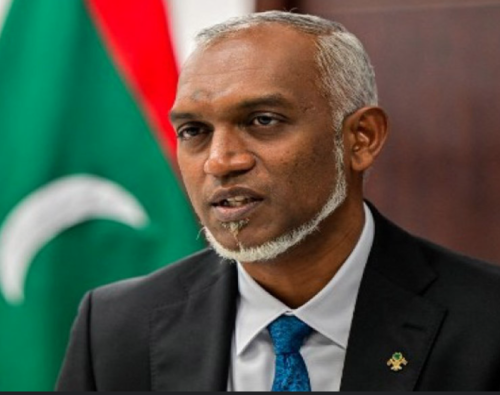Mohamed Muizzu is a Maldivian politician and the current President of the Maldives, having taken office on November 17, 2023. He is a member of the opposition Progressive Party of Maldives (PPM) and was elected in the 2023 presidential election, defeating the incumbent President Ibrahim Solih in a highly competitive race. His victory marks a significant political shift in the Maldives, as he is the first president to come from the PPM after its predecessor, Mohamed Nasheed, was ousted from power.
Early Life and Education
Born on March 10, 1974, in Malé, the capital of the Maldives, Mohamed Muizzu hails from a family with a long history of public service. He completed his early education in the Maldives and later pursued higher education abroad. He studied urban planning and development and gained experience in the field, particularly focusing on how to manage the growing needs of urban areas and the environment in the context of the Maldives, an island nation vulnerable to climate change and rising sea levels.
Political Career
Muizzu’s political career began in the Maldivian Democratic Party (MDP), but his political orientation shifted when he joined the Progressive Party of Maldives (PPM), which was founded by former President Abdulla Yameen. His political alignment with the PPM allowed him to gain prominence in Maldivian politics, especially within the context of opposition politics during the rule of President Ibrahim Solih and his MDP-led government.
In 2019, Muizzu ran for Mayor of Malé, the capital city of the Maldives, and won the position. As mayor, he became a popular figure for his focus on urban development, infrastructure, and addressing issues such as housing and waste management, which have long been pressing concerns for the residents of Malé. His tenure as mayor also solidified his position as a prominent figure in Maldivian politics, as he became known for his efforts to challenge the policies of the ruling MDP government and for advocating for the interests of the broader Maldivian population, particularly in terms of social services and economic policies.
Presidential Election Victory (2023)
Muizzu’s rise to the presidency came after a highly contentious and polarizing election in 2023. He ran as the candidate of the opposition and positioned himself as an alternative to the incumbent Ibrahim Solih, who had been in office since 2018. During the campaign, Muizzu capitalized on public dissatisfaction with President Solih’s administration, particularly in relation to issues such as economic challenges, growing inequality, and the handling of the country’s environment and climate change response.
Muizzu’s political platform focused on promises to improve the economy, create job opportunities, tackle corruption, and implement reforms to strengthen the country’s democratic processes. He also promised to work toward a more balanced foreign policy and to reduce the influence of external powers in Maldivian affairs, which has been a point of contention during Solih’s tenure, particularly regarding the country’s growing relations with India and China.
After a tense electoral campaign, Muizzu won the presidential election in the second round, defeating Ibrahim Solih by a significant margin. His victory was seen as a triumph for the opposition, and it marked a shift back to a more conservative and nationalistic political direction, following the MDP-led government’s progressive agenda.
Presidency and Policies
As President of the Maldives, Mohamed Muizzu faces significant challenges, both domestically and internationally. The Maldives, like many other island nations, is acutely vulnerable to the impacts of climate change, particularly rising sea levels, which threaten its very existence. One of Muizzu’s key priorities is expected to be addressing the environmental crisis, though his approach may differ from his predecessor’s. While President Solih was known for his active engagement with global climate policy, including advocating for international cooperation to combat climate change, it is expected that Muizzu’s government will focus more on practical, national-level solutions, such as coastal protection and sustainable development.
Muizzu’s election also signals a shift in the Maldives' foreign policy. During the Solih administration, the Maldives leaned toward strengthening ties with India, particularly through security agreements and trade partnerships. In contrast, Muizzu has voiced a more cautious stance toward international alliances, particularly in regard to balancing the influence of major powers like India and China. It remains to be seen how his administration will handle the delicate geopolitical balancing act between these two regional powers.
On the domestic front, Muizzu will need to address economic challenges, particularly rising living costs, unemployment, and income inequality. His election is seen by many as a response to public frustrations over economic stagnation and the increasing costs of living, particularly in the capital city of Malé. His government is expected to focus on improving infrastructure, creating jobs, and boosting the private sector.
Challenges and Outlook
Despite his victory, Mohamed Muizzu faces significant hurdles as he seeks to navigate the complex political and economic landscape of the Maldives. The country has a history of political instability, with tensions between various political factions often leading to protests and confrontations. As president, Muizzu will need to bridge the political divide between his administration and the outgoing MDP-led government, which still holds significant influence in the People’s Majlis (parliament).
Moreover, foreign relations will remain a key issue during his presidency. The Maldives' strategic location in the Indian Ocean makes it an important player in regional security dynamics. Muizzu will need to manage relationships with neighboring countries while asserting the country's sovereignty in a region that is increasingly dominated by geopolitical competition between India, China, and the United States.
Muizzu’s government is also likely to face international scrutiny over issues such as human rights and governance. The Maldives has seen significant progress in terms of democratic reforms since the overthrow of President Maumoon Abdul Gayoom in 2008, but concerns about political freedoms, judicial independence, and press freedom remain.


